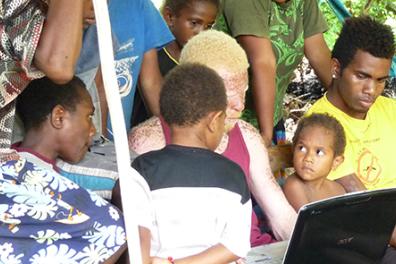Keyboards in the bush: how new technologies are changing the work of the field linguist in Vanuatu

Vanuatu is a small archipelago in the South Pacific (population approx. 290,000), where more than 130 vernacular oral languages are spoken. Since the late 2000s, new technologies, already partially present in the capital (including a historic cybercafé), have gradually spread to the islands, from cell phones (and more specifically, smartphones) to laptops and internet connections.
In a dozen years of research on three languages of Vanuatu, I've seen how the gradual arrival of new technologies (almost non-existent in 2007, ubiquitous today) in the country has changed the way I work, whether in the field itself, or upstream and downstream of surveys.
Relationships with communities...
A first, seemingly innocuous effect, but one that significantly alters relationships with informants, is the fact that the equipment (recorders, headphones, laptops) now seems less strange and intimidating to them, which lifts some of the inhibitions and makes day-to-day work easier.
But the most negative impact for fieldwork is also social. These new means of communication and entertainment have the same effect in Vanuatu as anywhere else: people are glued to their phones and, to a lesser extent, to their computers, and interrupt work sessions more often to exchange information by phone or text.
Also, recording, transcribing, translating texts and working sessions with informants are only part of the linguist's real work, and cannot suffice for language acquisition or provide enough data for a good language description. It's absolutely essential to join in with the people, to spend time talking to them, listening to them, asking them questions, etc., thereby combining the useful with the pleasurable.
Or these moments spent with speakers have often changed somewhat in nature. During a stay on the island of Gaua in 2015, evenings (typically the time of day when group linguistic interactions take place, men and women, adults, teenagers and children together) were very frequently spent watching films or videos (in English) on a laptop. All the phenomena of changes in sociability that are well known in the West can be found in the field, and inevitably alter the way in which we can work with people on the spot, without complaining about it: you can't stop people from living and having fun...
...to technical working conditions...
In parallel, technical working conditions have clearly improved. One example: many people invested in large solar panels and big batteries, and monetized the right to charge electrical devices, whereas it was still quite difficult to charge enough batteries for daily use of a good recorder at the end of the 2000s.
Once the fieldwork is over, social networks also make it possible on the one hand to keep in touch, and on the other to verify data remotely, which is crucial, as it's rare to have an informant in Europe who speaks the language you're working on (let alone a good one) for urgent verifications. Between my first field trips, I had to schedule telephone work sessions in advance (there was only one public telephone in the north of the island, located several kilometers from my informant's village), and these calls were dependent on the vagaries of the weather and the fluctuating quality of the telephone network. Today, I communicate regularly via social networks with various informants living in the villages, and if oral communication is necessary, the logistics of organizing a call are much less cumbersome, as almost all the islands are now covered by the telephone network, and almost everyone has a cell phone. This also allows informants to reflect and add to the story a posteriori, so that a written record remains.
... and to theory
Finally, and most interestingly, the arrival of new technologies (cell phones, and later the internet) has brought the population into the vernacular (and Bislama) written language on a massive scale. Remember that these are cultures with oral traditions. Education is in English or French, and in some islands, the majority of the population does not go beyond elementary school. 15 years ago, in rural areas, the written word in vernacular languages or in Bislama was limited to the Bible and a few posters sometimes put up in villages to announce a festival or ceremony in the neighboring locality.
Nowadays, people exchange messages in their own language on a daily basis. In the communities I know, I've noticed a renewed interest in vernacular writing and its standardization: workshops are being organized in schools, discussion groups are being created on Facebook, expressly focused on the practice of written conversation in the vernacular. This opens up some very interesting perspectives for a linguist. These new language practices, their rituals and obligatory passages, the modalities of online humor, as well as the ingenuity of the neographies implemented, are fascinating linguistic objects to study.
In light of this new type of writing(s), we need to question the alphabet proposals and literacy materials produced before the arrival of these new technologies. For at least twenty years, linguists have been asked to contribute to vernacular literacy, by producing teaching materials (storybooks, primers, lexicons), but until then their scope was essentially symbolic, as they didn't correspond to usage. Recently, I've noticed a renewed interest in these materials in the villages I work with. But many of the alphabets created by linguists over the decades for the vernacular languages of Vanuatu include special characters, elicited diacritics (notably macrons on vowels and nasal consonants) or subscripts, which are not easy to produce on smartphones or computer keyboards (which are generally designed for an Anglo-Saxon audience, since they come from Australia and New Zealand).
All the examples below were produced on Facebook by speakers of Sungwadia (spoken in the north of the island of Maewo). In example 1, we note that the chosen spelling for the phoneme [ŋ] is "ng", replacing the "n̄" proposed by Bible translators, then linguists (who would have written: "Karen̄a veti doqala tea").
1. Karenga veti dokwala tea...: "Don't say that...."
Of course, it's always possible for users to make do, but the ergonomics of these alphabets are really not optimal, and if linguists want their work to be of real use to communities, it's essential to take these new technical constraints into account.
More generally, as orthographies are not standardized, this new type of corpus also tells us something about the phonological and morphological perception that speakers have of their language. While workshops undertaken with speakers in the field do not always allow us to choose between a phonetic notation (one grapheme = one sound) and a phonological notation (one grapheme = one phoneme), the corpora collected online seem to indicate certain trends for each problem.
Example 1 shows how the complex phoneme [kw] is generally notated "kw". The single grapheme "q" proposed by Bible translators and later linguists is more in line with phonology, as the sound sequence [kw] constitutes a single phonological entity. But it is less intuitive, and speakers have not adopted it.

But on the other hand, in Example 2, the word pronounced [mbastau] is spelled "pastau" and not "bastau" (the spelling hitherto proposed by biblical translators and linguists), nor "mbastau" (which would be the phonetic spelling).
2. Nau masahita, pastau kakaka nau ta wia nga: "I was sick, but now I'm better".
The [p] sound does not exist in Sungwadia, but the explanation must be sought in Bislama, the pidgin that almost the entire population of Vanuatu speaks in addition to one or more vernacular languages. In Bislama, [p], [b] and [mb] are completely interchangeable, and so are the spellings "p", "b" and "mb". This linguistic fact is often transferred to graphic practices in Sungwadia.
On the morphological level, the corpora collected online also tell us a great deal. For example, the enunciative particle nga in example 1 is glued to the preceding word, which is often the case in these online attestations (but not always, cf. example 2), whereas others, such as the particle va, are never glued, as far as I know. Yet there is nothing a priori to distinguish the two morphologically.
Examples 3 and 4 show, in the same speaker, the segmentation hesitancy of the oblique personal mark paradigm after prepositions. Here, after the preposition "min", which introduces beneficiaries and addressees, the second-person singular marker is either "iko" (after haplology, perhaps?) or "niko". Both options are well represented in the corpus.
3. Risoata wia min niko: "Good afternoon to you!"
4. nikon ete na nogu email tewa nau mo soragi miniko : "You'll see the e-mail I sent you"
Linguists, participating de facto in linguistic standardization by producing vernacular language teaching materials, therefore probably have to make compromises and adapt, on every point, to community practices
While the arrival of new technologies in Vanuatu has not changed the core of the linguist's work, it has, however, as we can see, affected many of its parameters: from the technical to the social aspects of fieldwork, from the down-to-earth concerns of everyday life to the very objects of research.
Agnès HENRI
Research fields: Oceanian linguistics (Vanuatu)
Adjunct to the collections of the Société de Linguistique de Paris
Member of LACITO (CNRS UMR 7017- Langues et civilisations à Traditions Orales)